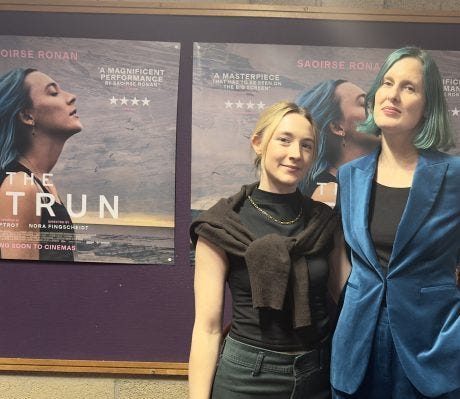In the comments to the entry on David Lynch’s hidden things, my friend Kate Armstrong — novelist, memoirist and climber — requests an investigation.
It would be really interesting/enlightening/instructive, I think, to take every post you write (and indeed every ‘Office Hours’ post George Saunders writes) and apply them not to fiction but to memoir. About fifty percent of the content would, sure, translate directly. But adapting/riffing off the fifty percent that doesn’t translate might produce a theorising about memoir more nuanced than anything currently out there (or anything I’ve found, anyway — but maybe there’s some Memoir Theory Genius I just haven’t come across…).
Kate’s estimate of 50% applicability is generous.
When making an entry in the diary, I’m not thinking at all about non-fiction. Not unless it’s the stated subject. Which is rare.
This semester I am teaching a Narrative Non-Fiction module, so am thinking a lot about forms of it. I’ve published two books of non-fiction — an essay collection, Mutants and a memoir, Wrestliana. And a few years ago, I gave a whole lecture on the ‘I’ in Amy Liptrot’s The Outrun.
Despite this, I feel less certain in speaking of non-fiction.
I have written or tried writing a greater variety of fiction over a longer period of time. That’s my woodshedding and dues paying.
I can say that I found writing Wrestliana harder, and more humiliating, than any novel I’ve written.
This may be because it required less imagination. Or what I usually think of as imagination, which is inventing non-existent events.
It is arrogant to begin any piece of autobiographical writing believing you have little to learn about yourself, and that you can escape being changed — damaged, improved, spent — by the work of self-examination and self-presentation.
I was arrogant.
At the beginning of Wrestliana, I believed I was more than capable of writing it. What I didn’t realise was that the main labour of getting it in shape would lie in becoming the person who was capable of completing that book.
I could begin it; another me would have to be there at the end.
You could say this holds true of fiction as well, but gaining technical skills or generic understanding is a very different thing to messing with your own soul or lack thereof.
(For soul insert self-image, if you’re more comfortable with that. But questions over what the you in you consists of are bound to arise.)
And so, to start thinking about addressing Kate’s prompt — which I’m she’ll have her own insights on — I’d say that the major difference between fiction and non-fiction is point of view.
Point of view as expressed through voice.
With fiction, allowing strong external influences into the work is less likely to cause total existential crisis.
Not completely unlikely. It’s still possible to feel that one is so beholden to the voice of another storyteller that one is just ventriloquising what they would have said, given the same subject.
And that therefore one doesn’t genuinely exist.
But when this self-examination turns inward, and involves looking at or trying to look at your own unique way of looking out at the world…
I hate continuation dots, so I’m leaving them here as a mark of self-disgust.
Which is certainly where autobiographical writing took me.
When one is one’s own subject, there is bound to be recursiveness, and that can quickly turn into mirrors mirroring mirrors, mise en abyme.
In autobiography, a sideways vertigo of self-consciousness is almost inevitable.
Much non-fiction isn’t focussed on a presentation of the self, or of material mediated by the sensibility of an ‘I’.
A straight history book can, if it wants, include the ‘I’ only in the Acknowledgements.
And even there, it can remain implied.
All the virtues of this small contribution to the field are those of my colleagues; all its errors, mine and mine alone.
Oxbridge tweediness in excelsis.
Increasingly, though, we go to non-fiction books not just for their subjects but their subjectivities.
Just as David Attenborough focalises the dinosaurs when he walks and talks with digital-them, so even quarks can be presented via a narrator’s quirks.
I’m not sure this is even a beginning of Memoir Theory.
The advice I’ve recently given about accepting and even pursuing the not-knowingness of writing almost certain doesn’t apply to non-fiction.
What happens next isn’t going to trouble you if you’re describing your memories of your fifteenth birthday party. What to include of all the many things that happened next is.
Perhaps, as Kate suggests, an examination of one and then another individual diary entry for usefulness or redundancy would be the best approach.
But I’m not going into that Hall of Mirrors right now.



It's absolutely true that the process of creating something which attempts to depict one's life depends on the growth of self awareness, the navigation through fact and analysis, and learning and understanding about the external world of the time. We cannot but be a different person at the end as at the start. What do we truly know about the beginning of our selves? Of course we are not in a position to write about the end. In recording facts and describing memories, aiming for the truth, we need to be honest with ourselves and others the extent to which we are curating material to conform to expectations they have, or we think they have, of us.
Well - this has given me food for thought. Updates on the result of that thought to come...